Items filtered by date: August 2023
Remedies for Toenail Fungus
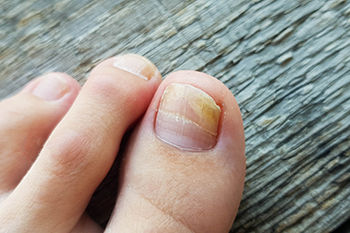
Onychomycosis, a fungal infection that primarily targets the nails of the toes, arises from diverse fungal sources, which can complicate effective treatment. Fortunately, a number of remedies are available to help combat this issue and restore healthy nails. Toenail fungal infections can lead to symptoms such as thickened, discolored, and deformed nails, causing discomfort and embarrassment. Topical medications, including antifungal nail polish, creams, and ointments, can be applied directly to the affected nail. For more severe infections, prescribed oral medications work from within to eliminate the underlying infection. Although they may require several weeks or even months of treatment, they offer better results for stubborn cases. Laser therapy is a less invasive option, which involves using a laser to target and destroy the fungal cells within the nail. In extreme cases, when the infection is particularly resistant or has caused significant damage, surgical removal of the affected nail may be necessary. This involves extracting the entire nail or a portion of it. If you have a fungal toenail infection that is not responding to common treatments, it is suggested that you consult a podiatrist for additional options.
For more information about treatment, contact Stanley Luksenburg, DPM of Home Foot Care. Our doctor can provide the care you need to keep you pain-free and on your feet.
Toenail Fungus Treatment
Toenail fungus is a condition that affects many people and can be especially hard to get rid of. Fortunately, there are several methods to go about treating and avoiding it.
Antifungals & Deterrence
Oral antifungal medicine has been shown to be effective in many cases. It is important to consult with a podiatrist to determine the proper regiment for you, or potentially explore other options.
Applying foot powder on the feet and shoes helps keep the feet free of moisture and sweat.
Sandals or open toed shoes – Wearing these will allow air movement and help keep feet dry. They also expose your feet to light, which fungus cannot tolerate. Socks with moisture wicking material also help as well.
If you have any questions please feel free to contact our office located in Fairway Park, OH . We offer the newest diagnostic tools and technology to treat your foot and ankle needs.
How Aging Affects the Feet
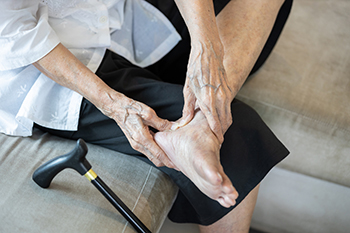
Aging affects various aspects of our bodies, including changes to the feet. Common problems that develop with aging affect the toenails, skin, and structure of the feet. Toenails often become thicker, more brittle, and susceptible to fungal infections due to diminished circulation. To counteract these effects, prioritize wearing comfortable shoes with wide-toe boxes to prevent crowding and promote airflow. Aging also impacts skin cell regeneration, leading to thinning, dryness, and skin lesions. This can result in cracked heels, corns, and calluses. Protecting the feet from the elements and opting for supportive, comfortable footwear will contribute to healthier skin as you age. The structure of the feet undergoes significant changes as you age, affecting tendons, ligaments, and arch support. Over time, tendons and ligaments lose elasticity and strength, leading to flattened arches and lengthened feet. The fat pads that cushion your heels also diminish, increasing the risk of heel pain, tendon tears, and muscle strains. One of the main ways of staving off the effects of aging on the feet is to invest in properly fitting footwear. Seek out shoes that offer proper support and cushioning. For help with foot problems as you age, it is suggested that you make a podiatrist a regular member of your healthcare team.
Proper foot care is something many older adults forget to consider. If you have any concerns about your feet and ankles, contact Stanley Luksenburg, DPM from Home Foot Care. Our doctor can provide the care you need to keep you pain-free and on your feet.
The Elderly and Their Feet
As we age we start to notice many changes in our body, but the elder population may not notice them right away. Medical conditions may prevent the elderly to take notice of their foot health right away. Poor vision is a lead contributor to not taking action for the elderly.
Common Conditions
- Neuropathy – can reduce feeling in the feet and can hide many life-threatening medical conditions.
- Reduced flexibility – prevents the ability of proper toenail trimming, and foot cleaning. If left untreated, it may lead to further medical issues.
- Foot sores – amongst the older population can be serious before they are discovered. Some of the problematic conditions they may face are:
- Gouging toenails affecting nearby toe
- Shoes that don’t fit properly
- Pressure sores
- Loss of circulation in legs & feet
- Edema & swelling of feet and ankles
Susceptible Infections
Diabetes and poor circulation can cause general loss of sensitivity over the years, turning a simple cut into a serious issue.
If you have any questions please feel free to contact our office located in Fairway Park, OH . We offer the newest diagnostic and treatment technologies for all your foot and ankle needs.
Understanding Ingrown Toenails
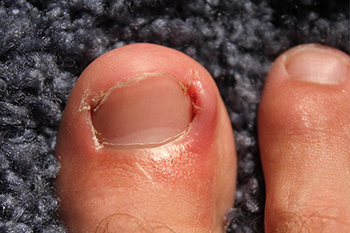
Ingrown toenails are a painful and common condition that occurs when the edge of the toenail grows into the surrounding skin. Several factors contribute to their development, including improper nail trimming, wearing ill-fitting shoes, injury, or genetic predisposition. Treatments for ingrown toenails vary depending on the severity. Mild cases can often be managed by soaking the foot in warm water and gently lifting the nail. However, more severe or recurrent cases may require medical attention from a podiatrist, including partial nail removal or antibiotics to address the infection. Prevention is the key to avoiding ingrown toenails. This consists of proper nail trimming techniques, wearing comfortable footwear with enough toe room, and avoiding foot injuries. If you have an ingrown toenail, it is strongly suggested that you contact a podiatrist who can effectively treat this condition.
Ingrown toenails can become painful if they are not treated properly. For more information about ingrown toenails, contact Stanley Luksenburg, DPM of Home Foot Care. Our doctor can provide the care you need to keep you pain-free and on your feet.
Ingrown Toenails
Ingrown toenails occur when a toenail grows sideways into the bed of the nail, causing pain, swelling, and possibly infection.
Causes
- Bacterial infections
- Improper nail cutting such as cutting it too short or not straight across
- Trauma to the toe, such as stubbing, which causes the nail to grow back irregularly
- Ill-fitting shoes that bunch the toes too close together
- Genetic predisposition
Prevention
Because ingrown toenails are not something found outside of shoe-wearing cultures, going barefoot as often as possible will decrease the likeliness of developing ingrown toenails. Wearing proper fitting shoes and using proper cutting techniques will also help decrease your risk of developing ingrown toenails.
Treatment
Ingrown toenails are a very treatable foot condition. In minor cases, soaking the affected area in salt or antibacterial soaps will not only help with the ingrown nail itself, but also help prevent any infections from occurring. In more severe cases, surgery is an option. In either case, speaking to your podiatrist about this condition will help you get a better understanding of specific treatment options that are right for you.
If you have any questions please feel free to contact our office located in Fairway Park, OH . We offer the newest diagnostic and treatment technologies for all your foot and ankle needs.
Keep Your Feet Healthy So You Can Stay Active
Simple Techniques for Diabetic Foot Care
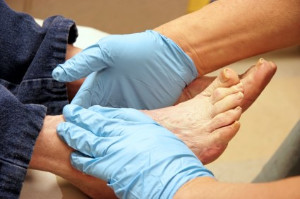
The risk of developing unwanted foot conditions may increase in diabetic patients. The importance of practicing good diabetic foot care is crucial in maintaining foot and overall health. This can begin with washing and drying the feet followed by applying a good moisturizer. It is beneficial to check the feet daily for existing cuts, bruises, and scrapes that may have developed. A family member or caregiver may help to accomplish this, in addition to helping trim the toenails. Wearing shoes and socks that fit correctly may help to prevent corns and blisters from developing, which may become infected. Diabetes occurs as a result of elevated blood sugar levels, and eating healthy foods may help to control this. If you have diabetes, it is strongly suggested that you are under the care of a podiatrist who can help you to monitor this serious condition.
Diabetic foot care is important in preventing foot ailments such as ulcers. If you are suffering from diabetes or have any other concerns about your feet, contact Stanley Luksenburg, DPM from Home Foot Care. Our doctor can provide the care you need to keep you pain-free and on your feet.
Diabetic Foot Care
Diabetes affects millions of people every year. The condition can damage blood vessels in many parts of the body, especially the feet. Because of this, taking care of your feet is essential if you have diabetes, and having a podiatrist help monitor your foot health is highly recommended.
The Importance of Caring for Your Feet
- Routinely inspect your feet for bruises or sores.
- Wear socks that fit your feet comfortably.
- Wear comfortable shoes that provide adequate support.
Patients with diabetes should have their doctor monitor their blood levels, as blood sugar levels play such a huge role in diabetic care. Monitoring these levels on a regular basis is highly advised.
It is always best to inform your healthcare professional of any concerns you may have regarding your feet, especially for diabetic patients. Early treatment and routine foot examinations are keys to maintaining proper health, especially because severe complications can arise if proper treatment is not applied.
If you have any questions please feel free to contact our office located in Fairway Park, OH . We offer the newest diagnostic and treatment technologies for all your foot and ankle needs.
The Impact of Psoriatic Arthritis on the Feet and Ankles
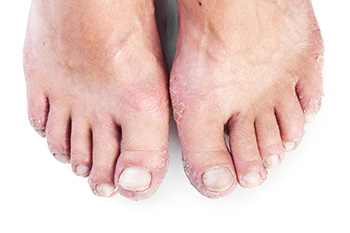
Psoriatic arthritis, or PsA, is a type of inflammatory arthritis that can manifest in individuals with the autoimmune skin condition psoriasis. This form of arthritis primarily affects the feet and ankles, bringing about inflammation and pain in the joints and supporting structures. PsA is frequently associated with various other foot conditions, including Achilles tendonitis, dactylitis, and plantar fasciitis. Achilles tendonitis is characterized by a painful inflammation of the tendon connecting the calf muscles to the heel where it attaches to the heel bone. Dactylitis involves severe inflammation around the toe joints, leading to swelling that gives the toes a sausage-like appearance and induces rigidity and pain when flexing. Plantar fasciitis refers to inflammation where the plantar fascia attaches to the heel bone, causing discomfort and hindrance in movement. As PsA progresses, it can significantly impede walking and performing daily activities, imposing substantial discomfort and limiting one's ability to engage in regular life pursuits. A cure for PsA does not exist yet, but various treatment options are available to manage the condition, slow its progression, and alleviate the associated symptoms. If you suspect or experience symptoms indicative of psoriatic arthritis, it is strongly suggested that you seek help from a qualified podiatrist for a proper diagnosis and personalized treatment.
Arthritis can be a difficult condition to live with. If you are seeking treatment, contact Stanley Luksenburg, DPM from Home Foot Care. Our doctor can provide the care you need to keep you pain-free and on your feet.
Arthritic Foot Care
Arthritis is a joint disorder that involves the inflammation of different joints in your body, such as those in your feet. Arthritis is often caused by a degenerative joint disease and causes mild to severe pain in all affected areas. In addition to this, swelling and stiffness in the affected joints can also be a common symptom of arthritis.
In many cases, wearing ill-fitting shoes can worsen the effects and pain of arthritis. Wearing shoes that have a lower heel and extra room can help your feet feel more comfortable. In cases of rheumatoid arthritis, the arch in your foot may become problematic. Buying shoes with proper arch support that contour to your feet can help immensely.
Alleviating Arthritic Pain
- Exercises that stretch the foot can prevent further pain and injury and increase mobility
- Most of the pain can be alleviated with anti-inflammatory drugs, heat, and topical medications
- Massages can help temporarily alleviate pain.
It is best to see your doctor for the treatment that is right for your needs and symptoms. Conditions vary, and a podiatrist can help you determine the right method of care for your feet.
If you have any questions, please feel free to contact our office located in Fairway Park, OH . We offer the newest diagnostic tools and technology to treat your foot and ankle needs.
